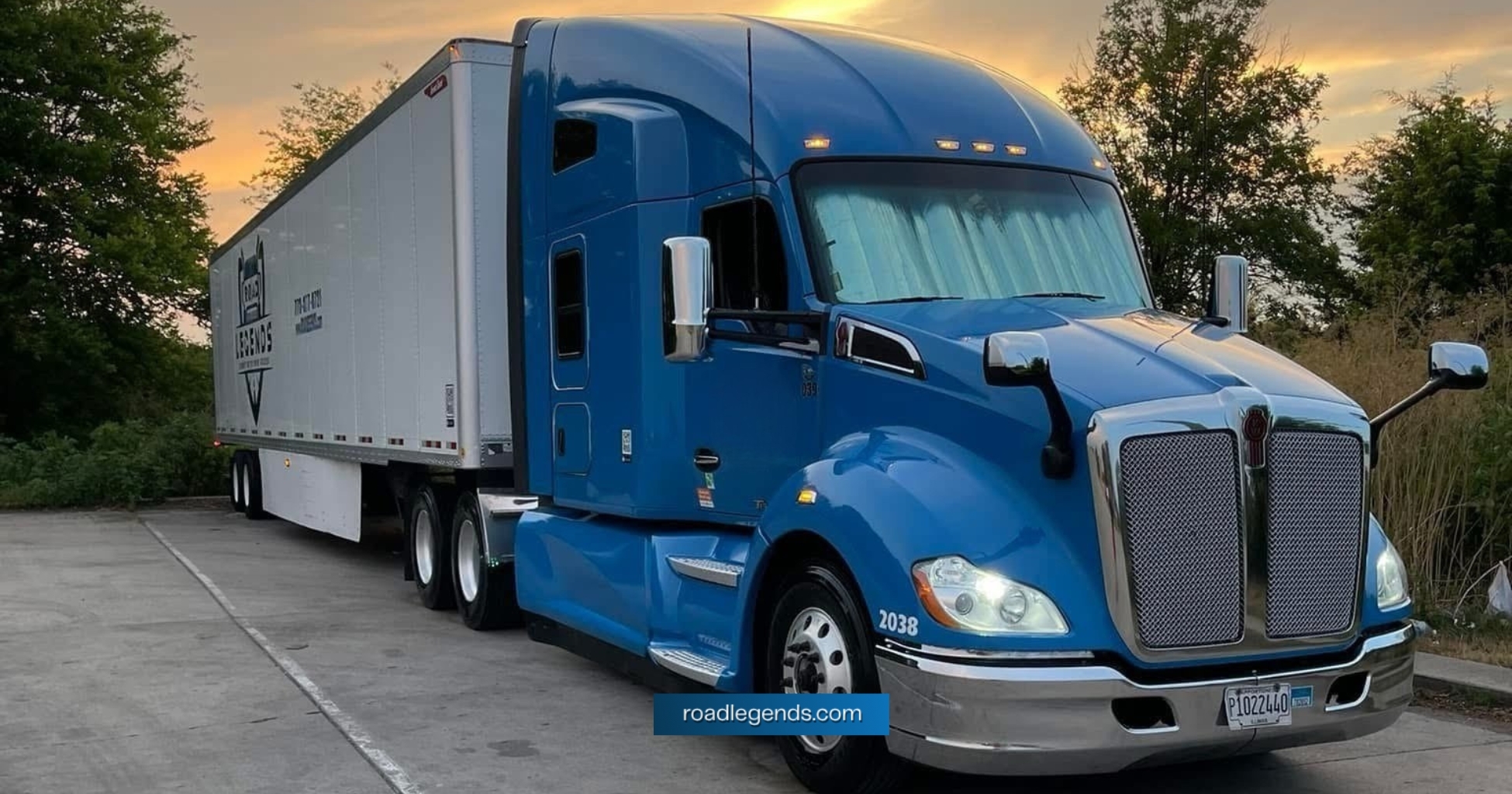
A Thorough Guide On How To Start A Trucking Company
There are numerous benefits to becoming your own boss. You are free to choose your own schedule, live your life as you please, and travel. It may provide the ideal fusion of financial success and independence.
Perhaps you wish to become an owner-operator while still working as a professional truck driver. Alternatively, you may be considering obtaining your commercial driver's license (CDL) in order to launch your own trucking company.
Starting your own transportation business and entering the trucking industry now is a wise decision. Although there is a high demand, there are not enough drivers and owner-operators to provide it.
We're here to provide you with all the information you require on how to start a trucking company if you're prepared to take the plunge. Starting a trucking company requires careful planning, knowledge of the industry, and compliance with regulations.
Whether you're a seasoned truck driver looking to transition into entrepreneurship or an aspiring business owner intrigued by the opportunities in the trucking industry, our group is here to support you. Join our community of trucking enthusiasts and learn how to start a trucking company from industry experts and fellow entrepreneurs who have successfully navigated this path.
How to start a trucking company
- Select your niche and target audience
- Choose whether to employ drivers or operate as an owner-operator
- Write up a business plan
- Hire an experienced lawyer
- Register your trucking business and obtain the necessary license
- Secure necessary equipment and trucks
- Finance your trucking business
- Hire employees
- Acquire customers
- Manage your finances
- Market yourself
1. Select your niche and target audience
As a fairly specialized industry, trucking can help you avoid competition from more established carriers and increase your earnings potential. Look out for the following:
- Which goods or trucking services do you find appealing? Your effort and money will be well spent if you choose a specialization that you enjoy.
- How can you outperform other haulers in terms of meeting the needs of consumers and shippers? What do you offer in terms of value?
- Who will profit from your services the most?
- Who are your preferred shippers if you are already familiar with the sector? What value do you as a niche carrier have to offer?
2. Choose whether to employ drivers or operate as an owner-operator
Independent truck drivers who are deciding on how to start a trucking company may already possess some of the requisite skills. You can become a self-employed owner-operator with certain equipment financing and commercial truck financing. But not everyone will enjoy it. You might rather do office work.
Decide right away whether you'll be driving yourself or employing drivers because this choice will greatly impact how you manage your entire business. To determine which is more economical and has the potential to generate more income, you might need to do some math. You should also assess your personal willingness (or lack thereof) to drive.
3. Write up a business plan
Writing down the fundamentals will give you a road map even if your understanding of how your business will work changes over time.
Include details about the kind of trucking firm you wish to operate in your business plan. Are you planning to operate a dry van business? You might wish to concentrate on specialized loads. It's crucial to explain how you intend to set your company apart from others.
Your goal for expansion should be included in any business plan as a crucial component. Do you intend to hire a team driver or perhaps even add more trucks in the future? Even if some of these things might change over time, writing down your ideas will help you come up with a strategy you can stick to.
4. Hire an experienced lawyer
A competent business attorney can assist you in avoiding costly legal blunders and defending your company when necessary.
The Federal Motor Carrier Safety Administration (FMCSA) and the Department of Transportation (DOT) regulate the trucking business (FMCSA). These governmental organizations take their laws and ordinances seriously and anticipate that trucking businesses will do the same.
This is why your company will greatly benefit from collaborating with a lawyer specializing in transportation safety compliance.
They can provide you with best practices and guidance when you start your trucking business. Additionally, they'll know the legal nuances if you ever get into trouble with the DOT or FMCSA.
5. Register your trucking business and obtain the necessary license
The first step in starting a trucking company should be registering your business and acquiring the required business licenses and permissions.
There are more than 150,000 filing jurisdictions in the USA, each with its own rules. Depending on your service and your state, a variable amount of licenses and permissions can be necessary for your business. Accordingly, you could need some or all of the following to run a trucking business:
- United States Department of Transportation (USDOT) Number
- Motor Carrier (MC) Number from the Federal Motor Carrier Safety Administration (FMCSA)
- A commercial driver’s license (CDL) and any necessary endorsements: Federal law requires drivers of commercial motor vehicles to obtain a CDL.
- CDL insurance is also essential to protect against potential liabilities.
- Commercial trucking insurance
- International Registration Plan (IRP) credentials and International Fuel Tax Agreement (IFTA) decal
You can separate your personal assets from your business liabilities and reduce some of the risks of unforeseen losses by operating your trucking firm as a properly constituted corporation or limited liability company (LLC). Additionally, operating your company in this way might give you a number of business, legal, and tax benefits.
6. Secure necessary equipment and trucks
Now that your paperwork is in order, you can start establishing your fleet. In general, adding more trucks will increase revenue, but big trucks are expensive. Starting small is probably a good idea, especially if you're new to the industry. If things go well, you can always expand your vehicles in the future.
Put some time and effort into the best strategy to obtain your initial fleet because reliable trucking equipment can mean the difference between success and failure in the trucking industry.
Consider your budget as a starting point and research your possibilities for purchasing as opposed to leasing trucks.
Additionally, think about which trucks are suitable for the cargo you plan to transport. For instance, refrigerated trucks are important for some commodities but not necessary if you are not shipping any perishables.
Performing a cost-benefit analysis on a few of the vehicle types you are considering might be beneficial. Do your study and make an effort to account for gasoline and maintenance costs. Older, used trucks are less expensive initially, but repair expenses mount quickly, and any time a truck is idle, is money lost. In general, newer trucks can deliver greater loads before they require major maintenance.
Finally, you might want to think about the fuel type you wish to utilize. Biodiesel or HVO fuel can be used in normal diesel engines as well. Utilizing alternative fuels to reduce carbon emissions could make your company stand out. Big shippers are looking to switch to greener supply chains more and more, so delivering trucks with reduced emissions could help you land a few more contracts.
7. Finance your trucking business
You might need to get funding because starting a trucking company requires some upfront expenditure. Small business financing is frequently obtained through business bank loans. You can buy equipment and pay for other capital expenses with these funds.
Using the vehicle or other financed equipment as security, your company might also be able to get financing from an equipment lender.
Boost your chances of getting finance by using your business plan. Include your predicted financial results, profit and loss predictions, and budget. With the help of these tools, you'll be able to determine how much money you'll need and how you'll pay back the loan.
8. Hire employees
You'll eventually need someone to take phone calls, make appointments, and keep track of business records if you want to run and expand your firm effectively. A legal, financial, or tax expert may be able to assist you in outsourcing some of these responsibilities, but in the end, you'll need competent personnel if you want your company to succeed. Even as an owner-operator, you'll typically need to hire at least one more driver so that you may switch off on your time off. One of your first hires will need to be a driver if you don't plan on operating a rig yourself.
The individuals you team up with can be just as important to your company's success as you are.
9. Acquire customers
Your company's truck fleet may be its primary source of income, but without clients, those trucks would be idle. It's likely that you already have at least one or two clients in mind if you're starting a trucking firm. If not, or if you intend to start growing right away, you must start marketing, networking, and advertising your company.
Networking opportunities and good leads can be found by joining trucking organizations. Having a quality website and knowing how to sell on social media are also crucial measures in the digital age. Despite the fact that you could only have a few clients when you first launch your company, your ultimate objective should be to widen your clientele through a successful sales approach. Variations in order flow could severely damage your business if you depend too heavily on a single customer.
10. Manage your finances
If you want to run a successful company after it gets going, you'll need to keep a tight check on your finances. Your running costs will frequently exceed your revenue when you first start a trucking company until you start bringing in more customers. Because of this, you should always try to obtain more money than you anticipate needing for your initial operational capital.
Keep in mind that many industries, particularly transportation, are cyclical. Everyone needs truckers to transport their goods from point A to point B when the economy is thriving. But the demand for commodities decreases when the economy weakens, as it does during a recession. To get through the tougher times, you'll need surplus capital—the equivalent of an emergency fund in business.
Since a firm with insufficient funds is seen as a riskier enterprise from a lender's standpoint, you might not even be able to secure the first investment from a bank unless you can show that you already have cash reserves.
Once you have funding, make cautious to safeguard it. Always pay back your loans on schedule to maintain a solid credit history.
11. Market yourself
One of the key elements after finalising the building blocks on how to start a trucking company is marketing.
The only way to guarantee a consistent flow of work for your trucking company is to market it. It's time to concentrate on spreading the word about your trucking company.
As the owner-operator is frequently the sole employee on their team, you'll need to practice yourself well.
Additionally, you will need to develop your sales skills if you intend to launch a modest fleet.
Create a strategy for marketing your trucking business and yourself. Choose strategies that you can actually put into practice every day without detracting too much from your primary line of work, which is trucking.
Your marketing initiatives will determine whether your business succeeds or fails.
Here are some ideas:
- Everywhere you go, use your truck as passive marketing ambassadors. Put stickers, or car wraps with your company name, logo, website, and contact information on each truck.
- Maintain contact with your clients and potential clients by creating a mailing list. This will establish your company in the public eye and increase the likelihood that someone will call when your services are required.
- Request recommendations from pleased clients' friends and coworkers. The most effective kind of marketing is word-of-mouth.
- Always have business cards with you, and distribute them when you perceive an acceptable time.
- Speak with nearby companies that might use your services and provide them with a special first-time rate.
Plan to actively seek out a new business in order to assist your trucking company in expanding.
Final words on how to start a trucking company
One of the pillars of the economies of the US and Europe is the trucking sector. It makes sense that this industry is always in demand since it is the main means of moving products and resources over land.
The other half of the struggle is having effective back-office operations to keep everything under control. Having a terrific vehicle fleet and the greatest team is half the battle.
Are you ready to start your own trucking company?

Best 11 Trucking Podcasts We Bet You’ll Actually Enjoy
Country playlists and radio talk had their charm, but podcasts have completely changed the game for drivers. Check out this list of the 11 best trucking podcasts.

6 Practical Ways To Manage Truck Downtime Before It Costs You
Truck downtime can drain your revenue and hurt customer satisfaction. Discover simple, proactive steps to reduce downtime, improve fleet performance, and keep your trucks on the road where they belong.

Driver’s Knee Got You Down? Here’s How to Fight Back
Spending long hours on the road can lead to knee pain, known as Driver’s Knee. Learn how truckers can prevent and manage this common issue.
